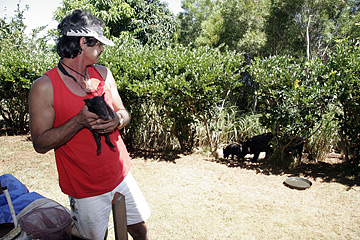THE 'PIG WHISPERER'
One man embraces the presence of feral pigs

CRAIG T. KOJIMA / CKOJIMA@STARBULLETIN.COM
Craig Stenstrom held a baby pig yesterday while its mother ate in the bushes nearby. He feeds a family of pigs that visits his yard daily at Waialae Nui Ridge.
|
|
A Waialae Nui man befriends wild pigs
He says taming them is better than hunting for population control
Craig Stenstrom strolled down his Waialae Nui Ridge neighborhood yesterday showing off new pets Wilbur and Fern, two of more than a dozen wild pigs that began showing up on his doorstep three weeks ago.
"They listen to me," said the 50-year-old Stenstrom, who calls himself the pig whisperer. "I got pretty attached to them."
Aha, a 280-pound feral pig, is expected to give birth to her second litter since first startling Stenstrom in his yard earlier this month. Stenstrom took to two in particular, Wilbur and Fern, who live in a pen he made in his backyard. Four others are frequent visitors to his yard and seem to obey his simple commands, such as "come" and "get away."
Stenstrom has lived in the neighborhood for 13 years and said this is the first time he has run into pigs. And he believes that what he is doing -- taming them to control a growing population -- is preferable to seeing them die in the hands of hunters.
But concerned neighbors believe the pigs do not belong in a neighborhood -- and that he shouldn't be feeding them.

CRAIG T. KOJIMA / CKOJIMA@STARBULLETIN.COM
Craig Stenstrom talked to pigs yesterday while the momma pig ate in the bushes nearby. He says he "got pretty attached" to the swine that began showing up on his doorstop.
|
|
"You don't know what kind of diseases they have," said a longtime neighbor who didn't want to be identified. "He should stop feeding them so they go away."
Even neighborhood children have been feeding the pigs after school, and some neighbors say that's asking for trouble.
"He's got a permanent problem now," said Ed Johnson, a state wildlife biologist and hunting coordinator. "Feeding them is the worst thing to do because they may never leave."
Stenstrom feeds the pigs fruits, vegetables and leftovers daily. The pigs even ate most of his mother's potted plants, including her favorite Jade plant.
"If I do come out of the house, then I have to carry a rake in my hand," said his 77-year-old mother, who did not want her name used. She said she had never seen pigs in the neighborhood until now. And when they get frisky, "I hit them in the okole and say 'go!'"
Stenstrom acknowledges that the pigs are not always friendly.
"Aha has tried to attack me a few times before, but I just tell her to stop," said Stenstrom, who recommends moving slowly when near the pigs and avoiding fast gestures. "The kids have to be standing behind me in case they do charge."
Noise has not been a major issue for the neighbors. But Stenstrom said their squealing wakes him up.
The squealing, Johnson said, often indicates hunger and, and if they're not fed immediately, they become aggressive.

